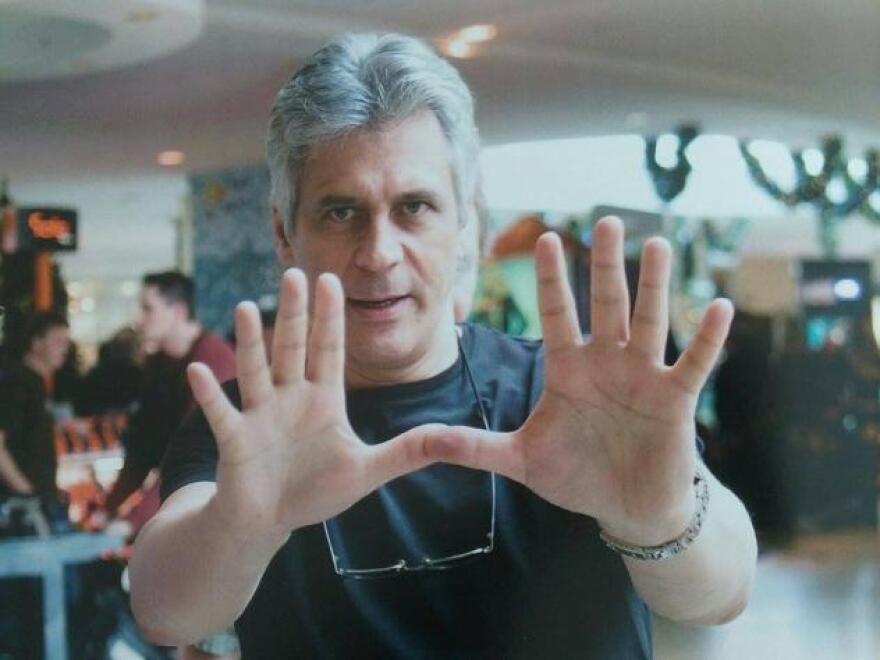People who call Las Vegas home have been trying to bolster the arts community for years. Now, it seems some of those efforts are paying off.
World-renowned authors are visiting, and some are even calling it their home. With its proximity to Hollywood, filmmakers are also making their way here.
James Orr is one of those people. He wrote "Three Men and a Baby" and "Sister Act 2," and produced "Father of the Bride" and its sequel. Orr is now about to teach a directing master class in Las Vegas.
What brought you to Las Vegas?
There was something more intangible about kind of a toxicity that was there [in Los Angeles], and it was seeping into everything and it as difficult to live there for me. I had to make a decision to stay connected to friends and colleagues I could move somewhere nearby and there were really only three choices to be an hour away by plane: San Francisco, San Diego and Las Vegas.
San Francisco wasn’t for me. San Diego, I quite liked, but Las Vegas ultimately prevailed. I came here with no friends, no local connections. But now that I’ve been here for 10 years I adore Las Vegas. This is one of the secrets of the nation.
It is easy for me to rave about living here and all the positives about living here. But sometimes I actually think I’m going to perpetuate the idiotic myth that it is an awful place just so they don’t move here and screw it up like they did Los Angeles.
On Las Vegas’ role in the film industry:
When I first moved here in 2008, my first thought was Nevada needs a tax incentive program to get more productions here. And it didn’t have a tax incentive program here in 2008. I remember talking to some pretty heavyweight political types in the city about doing that. And there was some interest, but not a lot of interest, and I kind of dropped it. Then, of course, they did institute a tax incentive program. But the way they worked it was completely wrong.
This is the greatest set on the planet earth. People are going to come to shoot in Las Vegas no matter what because you can’t find this thing that is the “Hangover” and other shows – television or movies – anywhere but here. You don’t need to incentivize them. You need to incentivize people who would go to New Mexico or Arizona.
What this program has done is, No. 1: It is not as attractive as the incentives in New Mexico or Arizona. And No. 2: they’re giving money to people who are coming here to shoot Las Vegas-set stories. They’re already coming here. Why would the incentivize people who are already coming? They’re wasting their money.
On the master classes he’ll be teaching:
I looked at the film schools in Las Vegas and there two film schools. UNLV has a film school and CSN has a film school. I know most of the people at both of those schools. They are well-intentioned professors and teachers, but there isn’t a lot of professional experience at either of those schools. I’m approaching the master classes to address two distinct audiences. One is students who want an edge, because you need an edge to succeed in show biz, I assure you. And there is a whole other class of people that I’ve encountered over my whole career, regular people who really want to write a script or make a movie and they don’t know how to do it and they don’t want to go to school full time. They want some direction, some information, some methodology to approach that. Everybody has a story. Everybody wants to write it and thinks the world will be interested in it. Because my class is intense but short, it appeals to that target audience as well.
On what he is currently working on:
I’m a writer and a director. And when you’re a writer, you can’t help but write. I’m writing an animated movie called the “Lost Pages of Fate,” because since the time I started in the business to now, animation has become a massive part of the business. When I started in the business, there was really only one animation studio and that was Disney. Then there was Pixar and now every major studio in Hollywood has an animation division because it’s such a big business.
On how have movies changed since the '90s:
There is a change not only in visual language but also in attention span and in general interest. In the '70s and '80s, if you look at the movies that were made they were what I call "humanist movies." They were about people in real life, like “Raging Bull” or “Three Men and a Baby” or “Outrageous Fortune,” they were about people in dramatic situations or funny situations. Then the fantasy world of comic books and ultimately video games has completely dominated the visual language, the attention span and the personality of the audience at large. By the time we got in to the mid-'90s and all the way up until now – the last 20 years roughly – the whole style of what kind of movies would work and what kind of movies were getting financed changed. You either had to adapt or realize that the world was getting ahead of you and you were a dinosaur.
On the difficulty of adapting to the change:
Yes, it has partly because I’m not interested in that kind of storytelling. That’s not why I got into the movie business. Strangely enough, all of those stories that I call "humanist stories" are all being done on television. Television, I think, is a richer source of narrative art than the movies. In the movies, everybody’s got a cape and superpowers. There’s no real pain. It’s total fantasy, which is fine. But if you want humanist stories, it’s all over television. That’s why I think television is having a new golden age.
James Orr, filmmaker








